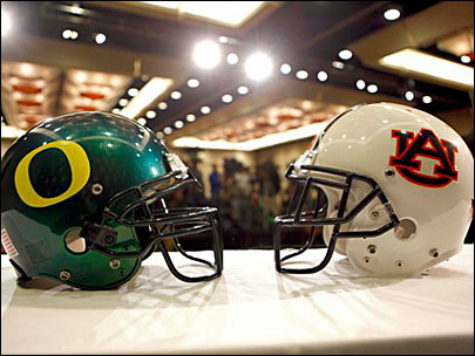
In January 2011, two teams faced off for the national championship. One has now admitted to “major infractions” and will be penalized by the NCAA, but the penalized team is not the one that would come to mind if one has followed college football coverage closely over the last few years.
At the very least, the University of Oregon is guilty of illegal phone calls to recruits, illegal payments to recruiting services, and an association with one of football’s more dubious characters, Willie Lyles, who has admitted to assisting Oregon in obtaining the services of two running backs: LaMichael James and Lache Seastrunk.
While Oregon’s acknowledgement of these major infractions has made news, it does not even come close to matching the time, energy, money, ink, internet space, and airtime ESPN has used to wage war on the other team playing in Tempe, Arizona in 2011–the Auburn Tigers.
Throughout the 2010 football season, ESPN was aggressive and took repeated hard-line stances, without evidence, that Auburn was at fault in the scandal involving Cecil Newton and Mississippi State.
Recently, ESPN heavily pushed a story by Selena Roberts that alleges numerous improprieties by the university. Unfortunately for the major network, however, the only people standing by that story are Roberts and Mike McNeil, who is now serving time after pleading guilty to first degree robbery.
Roberts’s story highlights a series of extreme cases of institutional abuse which, if true, would have been significant enough to deal the dreaded “death penalty” to the program. While there is no doubt that such improprieties have occurred in various programs within college football, the allegation that Auburn would have taken such actions at a time when its campus was swarming with journalists and NCAA investigators may lack common sense.
Moreover, ESPN was so eager to discredit the Auburn program, a program that will certainly be irrelevant in the SEC West this season, that it invested six months investigating a 2010 drug problem on the team.
However, the heart of what that investigation focused on was synthetic marijuana known as “spice.” ESPN alleges that use of the drug was rampant at Auburn during the 2010 season and that it was swept under the rug by the university and the football program. On the count that use of “spice” was widespread amongst Tiger athletes, ESPN is likely spot-on.
What the article fails to mention, though, is that the number of players even alleged to have tested positive is but a small fraction of the team.
Further, while insinuating that the 2010 national championship should be marred due to the usage of the drug, the article does not mention that a test for the drug was not invented until January 2011, weeks after the game, and that Auburn was a pioneer in testing the drug’s usage and began to test days after they acquired the ability to do so. Counter to ESPN’s allegations, Auburn took numerous documented steps to reach out to parents, to educate its student-athletes, and to prevent usage of the drug.
This testing was, by the way, being conducted on a drug that was not illegal in Alabama, the nation, or in the NCAA–and would not be for months. In fact, it could be bought over the counter until recently in the state and is a relatively new drug.
Auburn has since fired back on these and a number of other claims made by ESPN and other news outlets influenced by its coverage. However, the number of people that will read these statements of fact is dwarfed by the number of people who saw SportsCenter or read the coverage from ESPN.
If one falls into the category of most followers and only saw the news coverage, one would assume Auburn was guilty. However, their program has been exonerated, repeatedly, by the NCAA while other programs, including Oregon’s, have committed wrongdoing that has barely been covered.
Was/is Auburn University some sort of saintly program that has done no wrong? Almost certainly not, and I would add that none of Oregon’s infractions should cause that university to be seriously maligned either. What is at stake here is the accurate reporting of facts.
There are plenty of “bad actors” in college football. Some are part of institutions while countless others are on the streets, preying on amateur athletes. Those actors need to be found and exposed by the media, the NCAA, and, when applicable, the courts of law.
What happens when there is no competition in the media, however, is that any outlet with an axe to grind or the desire to print or tell sensational stories has the freedom to do so. While the Auburn and Oregon stories deserve to be told, no institution or its players should be demonized. The “demons” within should be sought and punished, but it is not the media’s job to target an entity simply because it wants to.
Because ESPN currently has, in essence, a monopoly on 24/7 sports coverage, it can act as judge and jury and tell whatever story it wants to tell without voices able to challenge.
With Fox Sports 1 set to launch later this summer, there could finally be some competition in sports coverage. What one can only hope is that such competition for viewership leads to a competition for credibility that enhances accurate coverage on both sides.

COMMENTS
Please let us know if you're having issues with commenting.